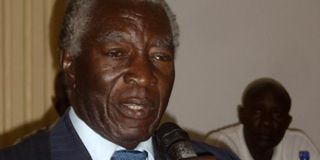Nyangweso: An avid boxer, committed soldier and shrewd politician

Nyangweso making a speech as Uganda Olympic Committee boss. On the right is him in his youthful days as a boxer at Namilyango College.
Kampala
Few would swank the late Major General Francis Were Nyangweso’s exploits in some notable spheres of life.
A boxer, soldier, and politician – he did it all to some telling heights and his name remains a mark in Uganda’s sport, albeit, with annotations of controversy.
“Sports has taught me to be disciplined and tolerant, to value public relations, and to keep my nerves, a thing that is very important for soldiers,” said Nyangweso in his prime.
“…but above all, to remain natural at all times,” he added, as quoted in a book titled Sports In Uganda, published by the Ministry of Information and Broadcasting in 1975.
Born on September 29, 1939 in the eastern border town of Busia, Nyangweso’s boxing talent won him friends with former President Idi Amin and he would go on to become such a prominent figure in both local and international sport.
In his mid 30s, Nyangweso was already a successful boxer internationally. He also went on become chairman of the National Council of Sports (NCS), Chief of Staff in the Ugandan army, serve as Defence Minister, plus Minister of Culture and Community Development in Amin’s government.
But it is boxing that cut him his forte. It is boxing that endeared him to former light heavyweight Ugandan champion, President Amin, a bond that saw Nyangweso run through military ranks, ministerial positions and ambassadorial posts at a breathtaking pace.
“He was also a very shrewd sports administrator,” shares Fredrick Musisi Kiyingi, a veteran journalist with the Daily Monitor, “Of course when money came in during his Olympic chairmanship days, he had his neck turned but he put heart to whatever he did.”
At home, Nyangweso was a lightweight national champion from 1954 until he retired undefeated in 1963. Across the border, he represented Uganda in the Millington-Drake Trophy against Kenya from 1958-1963 during which six-year period Nyangweso won all his bouts by knockouts.
On the international scene, he lost “controversially” – according to Sports In Uganda, at the 1958 Commonwealth Games in Cardiff and at the 1960 Rome World Olympics but was later to make ammends, winning a Gold Medal in the Israel Hapeal Games a year later.
The Uganda boxer had by now established himself in the sweet science sport to the point that invitations from Europe started pouring in.
In 1961, the London Amateur Boxing Association invited him to the UK for three months during which he became their champion. He was also voted Ugandan Sportsman of the Year in the same year. Nyangweso also participated in the UK-wide British ABA Championships where he lost in the finals.
Captain of the Ugandan boxing team from 1958 to Independence year 1962, Nyangweso then went on to win Uganda a Bronze Medal at the 1962 Commonwealth Games at Perth, Australia. Uganda was the only African country to win a boxing medal that year.
Politics and sports administration
He had done his bit with boxing and in 1963; the shrewd Nyangweso was to embark on another calling, joining the Ugandan army which consequently forced him to hang up his gloves.
He rose through the ranks rapidly until in 1974 when he became Army Chief of Staff at the rank of Major General. The same year, he was appointed Minister of Culture and Community Development. But it is in sports administration where Nyangweso had his impressive boxing career clash with his new found role.
Having also held the NCS chairmanship in 1971, Nyangweso had remained relevant internationally in his later years as IOC delegate by virtue of being the Uganda Olympic Committee president.
His alleged misdemeanors in sports politics soon had a renowned BBC whistle blowing programme, Panorama, claiming Nyangweso, an IOC delegate, was one of two Africans, who were induced to back Sydney’s 2000 Olympic bid (against Beijing).
As UOC president, he lived by example of most African leaders, clinging onto the job for three decades. But like all things come to an end, his stranglehold was loosened despite him remaining active as a member.
Like incumbents have always proved worldwide, the February UOC presidency polls were supposed to be a straightforward continuation of Maj. Gen Nyangweso’s 32-year reign. Current embattled UOC boss Roger Ddungu had duped Nyangweso into believing that a one Moses Twesigomwe was to be his challenger at the February polls. And true to Ddungu’s word, Twesigomwe presented himself on Election Day.
Nyangweso was to later find out the real challenger was actually Ddungu. It is said that some new blood in UOC had infiltrated Nyangweso’s camp eight months before the polls and convinced several members to throw him out. Come Election Day, Twesigomwe stepped down and immediately Ddungu stood up for election, winning with a 15-5 vote landslide.
Nyangweso was married to Rosemary, a former athlete, and together they had six of his children. The Observer once quoted Michael ‘Undertaker’ Wandera, a rugby player and one of Nyangweso’s children, saying his dad was a very liberal and objective man.“He always (let) us do the things we like,” he said.
The giant of Uganda’s boxing was to pass on in February 2011, a death triggered by kidney failure and diabetes. He may have had his poor vintage points in sports administration but few will doubt his service to the game.




